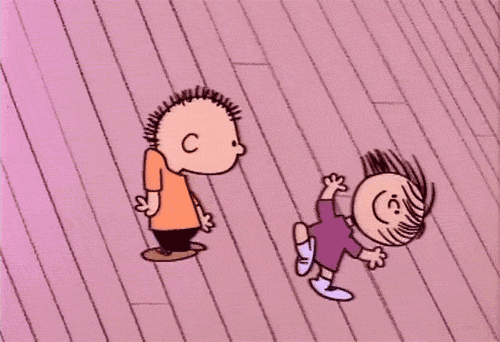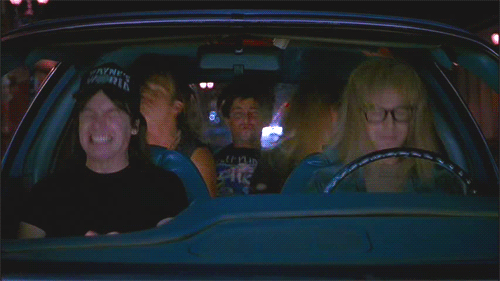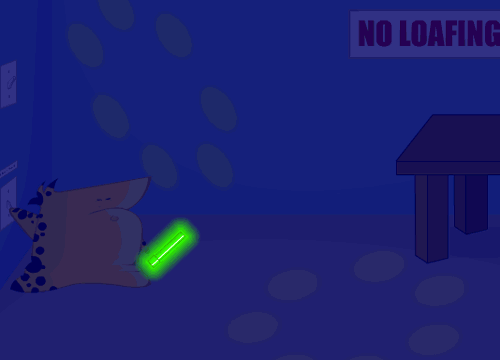|
Look at me, persevering to bring to the world this post that nobody asked for even though my laptop battery is well and truly dead. I actually am impressed that my Asus Vivobook has lasted three and a quarter years, which is about two years longer than any of my previous laptops from three different brands, and that's even considering I spilled Tang on the keyboard in January 2018. And also, the motherboard or hard drive isn't even fried like in my last three laptops, so I should just be able to get a new battery and be good to go.
The first thing I did for Halloween was the annual North Logan Pumpkin Walk. It was a walk with a bunch of pumpkins. Then I went to a meeting of USU's Asian Student Association where they talked about scary stories and urban legends from Asia. I saw it on Facebook and went for the scary stories and urban legends, not realizing it was a standard weekly meeting, but now I have to keep going back because they were all super nice and stuff. Okay, so the scary stories and urban legends are unsettling just to think about, which is obviously the point, but they're not real. But then we transitioned from just talking to watching YouTube videos, and then this adorable Vietnamese-American metalhead wanted to watch something about "the Hello Kitty murder", and she kind of neglected to explain that this was not an urban legend but a real life event. If you don't know what it was, I highly recommend not looking it up. It's the sort of thing that I was happier not knowing had ever happened to anyone anywhere at any time. But this girl kept a calm, pleasant smile on her face throughout the video. Sicko. I didn't dare say this, and maybe it's a stupid thing to say now either, but I noticed right away that she looked virtually identical to the victim, at least as far as I could see from the little black and white photograph, and she's about the right age to maybe possibly have been conceived around the time the victim died, and as I said her interest in the story was a little unsettling... so I'm going to pretend I believe in reincarnation because that's cool. Another real-life YouTube video we watched had to do with the haunting of the U.S.S. Forrestal after a horrific fire that killed 134 people. Personally, I have no problem accepting the many accounts at face value and believing that this haunting is legit. Ghosts and hauntings will probably never be scientifically verifiable but I don't think all the stories and eyewitness accounts throughout the world over the years can just be dismissed with a skeptical wave of the hand, and in this case, there are many such accounts. What makes it unsettling for me is not the persistence of life beyond the grave as such, which I accept as a basic tenet of my religion, but the way these spirits met their demise and how traumatized they must have been if they were still stuck haunting that ship for decades afterward. Burning alive or choking to death are horrible ways to die. Nowhere near as horrible as the Hello Kitty murder, which I highly recommend not looking up, but still not a joyride. And many of those sailors were probably draftees who didn't even want to be there. Prior to the Logan Institute of Religion's "Scream Fling 2019", they solicited suggestions to update their stale music selections. The guidelines of acceptable suggestions specified no profanity, even though "Cha-Cha Slide", which has played at every LDS dance I've been to since 2007, has a swear word in it, at least according to American English and nowhere else (see a recent post on that topic). They also specified no references to immoral behavior, even though "Macarena", which has played at nearly every LDS dance I've been to since 2007, is almost entirely about immoral behavior. I suggested some songs, and then I had to go to the dance to see if they implemented any of my suggestions, which spoiler alert, they did not. They played a few of their old songs, a few fresh and catchy new songs, and a lot of forgettable crap. For those who weren't around the last time I did so, allow me to once again list my favorite dance moves. The "George McFly"The "Salacious Crumb"The "Clone Troopers"The "Obscure Peanuts"The "Aman Mathur"The "Emo Phillips"The "Wayne's World"The "The Cheat"The "Italian Schoolgirl"The "Russian Riverdancer"The "What is Love?"
Because most of the music was forgettable crap, though, and because yelling small talk at a stranger for three minutes isn't my idea of a good time, I ended up laying on a couch looking at my phone. There my friend Terrah and her sister and one of their guy friends found me and made me take a picture with them. Then we left and walked home, with Terrah's sister making judgmental comments about the slutty costumes of the girls going to the university Halloween party, and the guy friend making pervy comments about same. I hit on some guy in a bra as he passed by, and he invited me to his apartment later. But we went to Terrah's apartment and played "Truth or Dare", and then around 10:30 we decided to get food, spent about twenty minutes deciding where to eat, settled on Wendy's, and returned to Terrah's apartment, and about this time I was yawning and thinking how nice it would be to go to bed, but the consensus of everyone who wasn't me was that we should watch a horror movie, and I felt like I should stay up for that because social life. Yes, I regret it today but I'll be dead someday regardless.
I'm not really into horror movies. The only ones I've seen are "Alfred Hitchcock's The Birds", "Little Shop of Horrors", "Poltergeist", "Sleepy Hollow", "The Chipmunks Meet Frankenstein", "The Chipmunks Meet the Wolfman", and "The Star Wars Holiday Special". Perhaps it's because, as the Hello Kitty murder demonstrated, many horror movies are too realistic for comfort and not the sort of escapism I have in mind when I look for escapism. The movie we picked, "When a Stranger Calls", (2006 version), is a story that technically could have happened in real life even though it didn't. Serial killers exist, cell phones exist, and incompetent parents and law enforcement exist. Too realistic for comfort. Yet I was pleasantly surprised to find it more unsettling than scary as such. I found myself viewing it through an objective, analytical lens as if I had seen a thousand of these movies. (Spoilers alert) Okay, so there's going to be a bunch of jump-scares that are actually false alarms, and Jill probably isn't going to die because then this movie would just be depressing and nobody would like it, and the killer is no longer scary when he reveals himself and gets angry because then you know he's no longer in control of the situation, and why are they acting like Rosa's body in the fish pond is a surprise when we all saw that coming forty-five minutes ago? Also, Hulu made us watch five to seven commercials every five to seven minutes, increasing the movie's runtime by at least fifty percent and effectively preventing the suspense from getting too suspenseful. Next time I will happily chip in three bucks to skip those. Admittedly, it was a nice touch that the killer was literally just some random white male with no motive, backstory or name given. You only see his face briefly but you can tell he's pure evil because he has a scar. The most unsettling part by far is the very end when, despite an ostensibly happy ending, Jill is in a hospital bed with her parents and the doctors trying to calm her as she screams and thrashes around and hallucinates that he's after her again. Yay for our protagonist getting possibly lifelong PTSD. It's pretty unfair that teenage girls are always the victims in these movies. I mean, not that an adult would deserve it either, but at least with her fully developed brain she would have a better chance of processing the trauma. To say nothing of the kids, though at least they survived, unlike the original movie. But what Jill should have done is keep stabbing the guy with the fire poker once she had him down, until he was well and truly dead. Then she never would have made eye contact with him and she would probably have fewer hallucinations. (Spoilers end) I know I keep saying "unsettled" or "unsettling". I'm not trying to be all macho by claiming that these things don't actually scare me as such. They don't, but plenty of other things do. I experience soul-crushing terror on at least a weekly basis. It's just usually instilled by more mundane things like seeing my crush at church or laying awake in bed at night and suddenly thinking in vivid detail about what it would feel like to fall out of an airplane. These other things unsettle me because they remind me how permanently uncomfortable I am living in this crapsack world of pain and injustice, but what can you do? I want to give a completely unrelated shout-out to an old friend of mine and some guy I don't know, who recently started a podcast dedicated to Star Wars in general and Knights of the Old Republic in particular. Check out their first episode here:
0 Comments
A recent article caught my attention, entitled "Feds take down the world's 'largest dark web child porn marketplace'." A more accurate headline would have been "Feds take down the world's 'largest known dark web child porn marketplace so far'", but nobody wants to hear that. The marketplace was jointly taken down by Germany, South Korea, the United Kingdom, and the United States, with additional cooperation from fourteen other countries. This is a beautiful example of international brotherhood and also a beautiful example of what federal law enforcement can accomplish when it isn't busy trying to arrest people for smoking a plant. The main guy behind it, Jong Woo Son, is now serving a prison sentence of - eighteen months. I kid you not. That better be just the beginning of his problems, because even the judge who sentenced Brock Turner is looking at that and going "Seriously guys?" Personally, I think everyone with any degree of involvement should be shot and used as Halloween decorations, but nobody asked me.
I imagine that seeing all of this child pornography and tracking down the children and infants involved must be traumatic enough for the investigators. But on top of that, they knew about this marketplace for a couple years, even figured out Jong Woo Son's identity, but were forced to be patient and cautious, even to buy some of the porn themselves, in order to eventually take the whole thing down. That must have been hell. And I'm not gonna lie, it disturbs me very much to imagine God watching every second of this rampant child and infant abuse and doing nothing to stop it. But the alternative is even more disturbing. The alternative is that these children and infants just got very unlucky with their one shot at life, and nobody is ever ever going to make it up to them, and the bastards who did this to them will never get what's coming to them because nothing that mortal justice can do to them, let alone what it will actually do, is good enough. At least God offers a long-term solution. I believe that God allows injustice in this life for at least three reasons. One, so we can learn to appreciate joy by contrasting it with suffering. Two, so we can develop our character by choosing how to react to our circumstances. Personally, I think anyone who applies either of these reasons to children and infants getting raped should be punched in the throat, but nobody asked me. The third and, I believe, only relevant reason in this case is that our freedom to make our own choices and decide what kind of people we want to be - indeed, the primary purpose of being alive in the first place - is too sacred for God to take away, even when those choices and those people are terrible. Jong Woo Son and his ilk have made their choices at the expense of countless innocents. But they won't live forever, and they won't avoid being held accountable for those choices. "It were better for him that a millstone were hanged about his neck, and he cast into the sea, than that he should offend one of these little ones." - Luke 17:2 Yet another recent headline, this one of a Pew poll, reports what everyone already knew: that the number of self-identified Christians in the United States of America is in rapid decline. The natural impulse is to blame "the wickedness of the world", but I think Christianity more or less has itself to blame for this. Now I believe that the vast majority of denominations and individual Christians are, on the balance, good, and this is not an attack on anyone in particular. But one can hardly blame young people for leaving in many cases when they realize that the Earth is more than six to ten thousand years old, that their gay friends and family members aren't evil, that the Republican Party platform isn't scripture, and/or that a god who sends a solid majority of his children to live in circumstances where they will never have the opportunity to avoid burning in hell forever is unworthy of worship. The historical atrocities and the scandals and hypocrisy of various preachers, priests and bishops probably don't help either. "Fundamentalists are to Christianity what paint-by-numbers is to art." - Robin Tyler And yet the "liberal" churches aren't doing better. If anything they're doing worse. It's a bizarre fact of life that while countless people are leaving Christianity over LGBTQ issues, every single denomination that has embraced same-sex marriage is plummeting. Some are on course for swift extinction. I would imagine this is more a case of correlation than causation. I would imagine it has more to do with the the denominations in question loosening, softening, and dumbing down their doctrine to the point where Jesus is just a guy who said we should be nice to people. And many, many people want to believe in that version of Jesus, but by and large they have little to no interest in organized religion. Why go to church for the same sermon you could get from an episode of "Barney"? So appealing to them is a doomed endeavor from the start. "[I]t is a characteristic of our age that if people want any gods at all, they want them to be gods who do not demand much, comfortable gods, smooth gods who not only don’t rock the boat but don’t even row it, gods who pat us on the head, make us giggle, then tell us to run along and pick marigolds." - Jeffrey R. Holland Of course the main reason I'm hearing about this poll is what it says about my denomination, The Church of Jesus Christ of Latter-day Saints. Those within the Church may or may not have noticed how all the bragging about how fast we're growing has quietly disappeared in the last few years. That's because it's not true anymore. It's also not true, as detractors assert until they're blue in the face, that we're shrinking. In fact this poll reports that we're holding steady at 2% of the American population. (Probably less than half of that percentage actually goes to church on a semi-regular basis, but whatever, we still love them.) So, yay? Other churches are shrinking but ours isn't. The bar for success has been set pretty dang low nowadays. My church is certainly not devoid of real and perceived problems, and has also lost thousands of members (though not as many members as it's gained, which is where the detractors' basic algebra skills suffer a critical failure). But I believe it's managed to hold steady by making adjustments and compromises where it needs to, and standing firm where it needs to. It makes constant course corrections, as it's done throughout its history, to hew to the state of "optimal tension" described by Armand Mauss and others. For example, President Russell M. Nelson has made changes to reduce the amount of time that the Church takes members away from their homes and families, yet church standards and callings remain rather "strict" and "demanding" by the standards of most denominations, which ensures that participation actually has significance and makes lasting changes in people's lives. "Let us here observe, that a religion that does not require the sacrifice of all things never has power sufficient to produce the faith necessary unto life and salvation..." - Joseph Smith Jr. The negative reputation of organized religion is not entirely undeserved. But the great strength of organized religion that gets overlooked, that individuals simply can't replicate, is its ability to unify and empower people to accomplish good in the world. Organizations like my church and the Catholic Church are able to leverage their collective faith into countless local and global humanitarian efforts that of course no normal person could ever hope to replicate. That's not to say secular charities aren't wonderful, obviously, but just to illustrate that as far as faith is concerned, working together has far more practical efficacy than being "spiritual but not religious" on one's own. Believers, when they aren't being pricks, also edify and strengthen each other when they unite. This sense of community is such a basic need for most people that those who leave religion, or even those who are openly hostile to religion, struggle to find a secular replacement for it. And even when believers are being pricks, like me, they can still teach us how to love, if we choose to learn, which I usually don't because it's hard. "In the life of the true Church, there are constant opportunities for all to serve, especially to learn to serve people we would not normally choose to serve - or possibly even associate with - and thus opportunities to learn to love unconditionally. There is constant encouragement, even pressure, to be 'active': to have a 'calling' and thus to have to grapple with relationships and management, with other people's ideas and wishes, their feelings and failures; to attend classes and meetings and to have to listen to other people's sometimes misinformed or prejudiced notions and to have to make some constructive response; to have leaders and occasionally to be hurt by their weakness and blindness, even unrighteous dominion; and then to be made a leader and find that you, too, with all the best intentions, can be weak and blind and unrighteous. Church involvement teaches us compassion and patience as well as courage and discipline. It makes us responsible for the personal and marital, physical, and spiritual welfare of people we may not already love (or may even heartily dislike), and thus we learn to love them. It stretches and challenges us, though disappointed and exasperated, in ways we would not otherwise choose to be - and thus gives us a chance to be made better than we might choose to be, but ultimately need and want to be." - Eugene England In the fabulous speech/article "What Happened to My Bell-Bottoms? How Things That Were Never Going to Change Have Sometimes Changed Anyway, and How Studying History Can Help Us Make Sense of It All", which I recommend reading in its totality because it's very interesting, Craig Harline says,
"We can start with something as simple as language. My good-hearted mother sometimes washed our mouths out with soap when we used slang words she thought were bad, so imagine my surprise when I learned decades later that some of the slang words she used herself were originally obscene. (I won’t repeat them so I don’t torment her or anyone else who uses them, because heavy is the burden of historical knowledge.) At a recent BYU devotional, the fairly young speaker used a word that originally was even more obscene than my mother’s favorites, and no one batted an eye, because to the speaker and most of the audience it was just a fun noun. Or how about the phrase 'Good grief,' so wholesome that even Charlie Brown says it? Turns out it’s just another minced swear word, with the 'good' referring to God (as it does in any English minced swear word containing 'good'). In fact, there are hundreds of such words, and most people reading this probably say some of them regularly without thinking them bad while thinking certain other words definitely bad, which I know because I and the rest of the historical police hear you." I can add that in the Game Boy version of the classic "Lego Island 2", which is entirely devoid of objectionable content of any kind unless shooting robots with pizzas offends you, a couple of the medieval knight characters say "Gadzooks!" and/or "Zounds!" These terms are also in Shakespeare's works and probably thousands of other sources. Harmless, meaningless medieval slang to express shock or surprise, right? No, because "Gadzooks" is a minced swear word for "God's hooks" and "Zounds" is a minced swear word for "God's wounds". Ick. My first thought when reading this passage, in any case, was that it sheds some light on my parents' perplexing aversion to me saying "sucks" like literally everybody else in my peer group, and why my dad hit me for saying "fricking" after I heard it in Sunday school from my twenty-something Sunday school teacher. My second thought was that it really highlights the absurdity of "swear words" as a concept to begin with. We've decided to have words in our language that we're not allowed to say, but euphemisms that evolve from them, and alternate words that mean exactly the same thing, are fair game. I'm sorry if the following is a weird example to use but it seems like a good one because it includes not two, but three words at varying levels of acceptability. One word for female genitalia is clinical and objective, another is vulgar even though it used to mean "cat", and another used to be clinical and objective but now is so offensive that even people who toss around f-bombs to their hearts' content usually shy away from it. And that makes no fricking sense. Nor are swear words consistent across cultures. As far as I can figure out, the United States of America is the only part of the English-speaking world where "damn", "hell", and "bastard" are considered swear words. I don't know why but I assume it's just another case of Americans thinking they're better than everyone else and then being stupider than everyone else instead. Even here, though, an overwhelming majority of people drop those words in casual conversation with a clear conscience. While I am hardly an advocate of argumentum ad populum in most situations, it seems relevant in this case because literally the only reason swear words are "bad" is that people decided they are. So if people become entirely desensitized to their use and nobody cares anymore, shouldn't that mean by definition that they're no longer "bad" and no longer swear words at all? Just like in the rest of the English-speaking world? Sometimes people argue that swearing is bad because it's "unintelligent" and/or "lazy". I actually agree that excessive swearing (such as when I have problems with my computer), sounds very unintelligent (but not lazy, as I'm generally very energized at the time). But so do a billion other slang terms, catchphrases and buzzwords that aren't considered obscene. "Oh my heck" sounds so ridiculous that when I moved to Utah I was surprised to find that people actually say it unironically, that it isn't just a stereotype, and by all rights according to this logic it should be one of the worst swears out there. Most people, including and especially myself, are not the epitome of articulation and thoughtfulness when they speak. Most people regularly say a lot of things that provide no benefit to the world and wouldn't be missed if they hadn't been said. Kind of like my blog. I thought I had a lot more to say on this subject, but I don't, so you all get to go home early. ADDENDUM: I don't often do this, but I found this passage from a paper by Ben Spackman that's too good not to include. Speaking of the Bible... "Another issue of register concerns differing cultural expectations in terms of sacred writing and language. That which is taboo, shocking, or offensive in one culture may not be in another. While a few originally inoffensive passages became so by translation into a different time or culture, sometimes the prophets intended to shock and offend. One scholar even advises, 'If you do not wish to be shocked and disgusted, then stay away from reading the prophetic texts.' Some of these difficult passages have been bowdlerized in the past, some overlooked due to archaic language, and some just never noticed due to their relative obscurity. For example, 'The Hebrew Bible regularly uses the root ŠKB... "lie (with)" as a euphemism for sexual intercourse. But on four occasions the more direct verb ŠGL... occurs. Scholars agree that ŠGL was a word for sexual intercourse, but it may or may not have been vulgar (therefore, we cannot supply an exact English translation). In each of the four instances, ŠGL appears as part of a threat or condemnation, and always with the clear intention of shocking the audience... Obviously, the authors of these lines [in Deuteronomy 28:30, Isaiah 13:16, Jeremiah 3:1–2 and Zechariah 14:2] deliberately chose strong language—if not actual vulgarity - in order to horrify, upset and rattle their audience.' "The English in 1 Samuel 25, involving David, Nabal ('Fool'), and 'every one that pisseth against the wall,' was not offensive when first published, but has now become so as American English has shifted. Translating in such a way as to avoid offending readers, as most modern translations do, turns out to obscure important connections within the story. Even if justifiable 'to provoke revulsion and disgust' and contextualized within its own time and culture, the graphic sexual, violent, or scatological imagery used by several prophets, particularly Ezekiel, challenges scholars and those who hold the Bible in high esteem. "How should translators deal with these passages, far more numerous and problematic than most readers realize? They are not limited to the Old Testament. For example, Paul's use of 'you foolish Galatians' may be deliberate use of an ethnic slur to forcefully grab the attention of his audience, equivalent to 'you stupid rednecks!' In Philippians 3:8, he disdainfully describes as 'dung' (KJV) all he gave up to gain Christ (potentially a considerable amount) but some scholars bluntly suggest a different four-letter word is a more accurate translation. The NET Bible notes that skubalon 'was often used in Greek as a vulgar term for fecal matter. As such it would most likely have had a certain shock value for the readers.' Complicating matters, the same skubalon letter contains 'the admonition of Paul' to seek out whatever is pure and commendable, among other adjectives (Philippians 4:8). How does Paul reconcile his use of language with this admonition? "Why are these passages so troublesome? Setting aside those examples in which prophets intended offense, other reasons exist. Modern readers have come to apply certain assumptions and expectations to the idea of 'Holy Scripture' which were foreign to its authors. John J. Collins remarks, 'When [certain Old Testament] stories are read as Scripture, they become more problematic, because of a common but ill-founded assumption that all Scripture should be edifying,' i.e., positive and uplifting. Ancient prophets did not labor under many of the assumptions we attach to scripture today, because they are largely modern assumptions. The contents of our 'Holy Scriptures' did not become such until long after they were written or preached. 'Jeremiah, Ezekiel, Isaiah et al. had no sense of the white-covered, gold-cross embossed Bibles in which their prose was to be packaged, nor had they been briefed on the standards of Western literary decorum against which they would inevitably offend.' Even our basic concept of 'scripture' today would be somewhat foreign to them. Certainly they would have thought they were operating under the Spirit of the Lord, but they were rarely conscious of authoring something that would become canon or 'Holy Scripture,' because it did not exist as such. Few prophets have ever written with the idea of 'I am adding to the canon,' because there was neither a formally established canon nor a concept of canon (generally in the Old Testament period), or because the canon was something other and past; in the New Testament period, 'scripture' referred broadly to the writings of Old Testament prophets (as in 2 Timothy 3:15), not things such as Paul's letters or the Gospels which were being written at the time. Indeed, Peter and Paul (and sometimes Joseph Smith in the Doctrine and Covenants) were simply writing letters to congregations, not attempting to produce canonized and inspired writing fit for all Christians in all times. "The writings eventually canonized as the Bible accurately reflected life in its variety, with language humorous and serious, sacred and profane. But once combined with other books (Greek ta biblia, source of the term 'Bible,' means 'the books,' not The Book) and canonized as 'Holy Scripture,' certain expectations and assumptions came to be applied to each book and passage as though these criteria existed at the time, and prophets had written with them in mind. Consequently, the kind of language expected by the target community does not always match the kind of language used by the prophets. Should the translator privilege sensitivities of the target community, who may expect 'Holy Scripture' to use elevated, archaic, antiseptic language, or should they provide culturally accurate translations of the text, which would create the same kind of reaction among its readers as among its native audience?" A Post About the October 2019 General Conference of The Church of Jesus Christ of Latter-day Saints6/10/2019
This weekend was the General Conference of the Church of Jesus Christ of Latter-day Saints, and I'm tired of explaining what that is twice a year, so from now on I won't. As usual I will fixate on a few details instead of attempting to summarize the whole thing.
I didn't much care about the changes to the Young Men's program, which will have approximately zero effect on my life, nor would I have cared about the corresponding changes to the Young Women's program - except for my hope that they would dispense with the longstanding age-based class names, "Beehives", "Mia Maids", and "Laurels". From the time I was a teenager, I thought those names sounded stupid. But after learning their historical significance and the reasoning behind them, I just thought they sounded stupid. Really, just because a name made sense in Utah in 1950 doesn't mean we need to hold onto it forever. For zark's sake, the "Mia" in "Mia Maids" stands for "Mutual Improvement Association" which literally hasn't been a thing since before the current Young Women's parents were in Young Women. So I watched the women's session, or to be more precise, listened to the women's session while playing "Plants vs. Zombies", just to see if these stupid names would be relegated to the dustbin of history where they belong. Yes, I could have just waited until after to find out, but I wanted the pleasure of witnessing this long overdue moment firsthand. And also feeling the Spirit and stuff. I was not disappointed. Although, now that the archaic term "Mutual" is being entirely jettisoned as well with respect to both the Young Men and Young Women programs, the Mutual dating app (which I wrote about at greater length here) may need to be renamed as well to retain its significance to future generations. I recommend "The App for the Assistance of Members of The Church of Jesus Christ of Latter-day Saints in Marrying and Procreating Within the Boundaries of the Lord's Divine Law of Chastity". It's not catchy, but every word is important. My karmic reward for watching an extra session for such a petty reason came swiftly. President Nelson said some words and then he started talking about temples and I was like Wait, this is the way he starts talking before he announces new temples, but he does that at the end of the Sunday afternoon session, so surely he wouldn't oh who am I kidding, of course he would troll us like this just because he can and at that moment the WiFi freaked out and the audio inexplicably cut in to the late Elder Perry talking about the joy of keeping the commandments with soft inspirational music in the background, and I frantically refreshed the page while breaking a commandment or two in my frantic verbal outburst, and then President Nelson was back and he was blurry and his lips weren't synchronized with his voice but that was fine, at least I could hear him, but wait, was this a rerun of the temple announcements from April, because it sounded kind of similar, but no wait, it was fresh and he totally trolled us and I would have been pissed if I had missed that session or that fragment of the session. What follows are my very professional and spiritual analyses of those temple announcements. With this batch compared to the last one, there seemed to be a bit of a shift back toward building temples where the number of members and stakes justifies it, as opposed to prioritizing convenience for members in far-flung locations even if they be few. But of course both elements are still at play. Cobán, Guatemala - I expected this one, but not for a few more years since it's kind of out in the jungle, but then, with the way some recent announcements have gone, I expected the unexpected which means I expected everywhere and nowhere at once. Cobán, Reykjavik, Mars, it's all fair game for President Nelson, isn't it? Bacolod, Philippines - It would seem that the Philippines has somewhat improved upon its historically abysmal activity and retention rates, with stake growth on the increase and five of its seven current or future temples announced in the last decade. Bentonville, Arkansas - Arkansas is one of the states in the United States without a temple, and the Rogers area is one of the few areas in the United States more than two hundred miles away from one. So it's been on people's lists for years and gotten really annoying. Bentonville should be close enough to shut them up. Freetown, Sierra Leone - How can the Church have a faith-promoting independent film based on a true story named after this city, but not a temple? It's about time that situation was rectified. By the way, notwithstanding its imdb rating, I recommend the film. "God's Army" it ain't but on the plus side, "The Singles Ward" it ain't either. And it's not a comedy but because it's set in West Africa it has a few moments that are actually funny without an insider knowledge of Provo culture that most people neither have nor desire. McAllen, Texas - I'm surprised all the Saints in Texas didn't apostatize after they were told to stop bringing their guns to church. Miracles do happen in this day and age. It may serve several members in northeastern Mexico as well, but then again it may not, because owing to policies and politicians who will not be discussed here at this time, traveling across the border has become an absurdly arduous and time-consuming process. Even for Americans! Orem, Utah - This, in case I've failed to mention it before, is the city where I was born. Unless I'm mistaken we moved before my first birthday; in any case, I don't remember it one bit, and since it's basically Provo I've never had the slightest desire to go back and see it ever. Still, yay for getting a temple in the city where I was born. Especially since getting one in the town where I grew up is about as likely as Mars. Port Moresby, Papua New Guinea - This is one of those locations where a few years ago people were bragging about the dramatic growth of the Church, and then it just kind of fizzled out overnight. (See also: Madagascar.) Still, membership numbers more than warrant a temple even without taking into account their poverty and the long distances to their nearest ones in Australia and New Zealand. Taylorsville, Utah - ANOTHER TEMPLE IN UTAH!!!!!!! HOW VERY EXCITING!!!!!!! I CAN BARELY CONTAIN MY EXCITEMENT FOR ANOTHER TEMPLE IN UTAH!!!!!!!1
Of course, I'm not one of those "uTaH dOeSn'T nEeD mOrE tEmPlEs" folks, because my intellect is capable of grasping the concept that buildings have a finite capacity and sometimes can get too full.
My favorite talk was by Elder Peter M. Johnson. An African-American from New York City, his voice has a cadence not quite like anything I've heard in General Conference before, and it riveted me to his every word so that I got more out of his talk than most. He could have read a phone book and I would have paid attention. This also would have given phone books a reason to exist. The missionaries seated near me who appeared to have fallen asleep might not agree, but to each their own. So, you know, go ahead and watch it if you haven't.
With only a few minutes remaining in the final session, I felt somewhat alarmed that nobody, as far as I could notice, had remembered to utter the words "this historic conference". But President Nelson slipped them into his talk and put me at ease. That man never lets me down.
In closing, I would like to change subjects completely and note the passing of actress Diahann Carroll. I read this little book of comics once that I could have sworn was written by Charles Schultz, but it had a multiracial cast and almost exclusively focused on race issues, but I can't find out anything about it now, but anyway in one comic this little black boy was like, "I'm very disappointed in this book 'Black Beauty'. I thought it was going to be about Diahann Carroll." And all these years later I still think that's one of the funniest things ever. Dihann Carroll will be remembered as the first black woman to win a Tony award (back when the Tony awards had standards, no less) and the first black woman to star in a non-stereotypical television role (I guess we're not counting Lieutenant Uhura? idk, I'm just going by what Wikipedia says), but to me, she will mostly be remembered a. for the aforementioned comic, and b. for her guest role in "The Star Wars Holiday Special" as singing Wookiee porn. I don't know how else to describe it. Between her dialogue and Chewbacca's father's horrific reaction to it, one marvels that this scene was allowed on television in 1978 or ever. And then one realizes, oh, of course, by that point in the Special the censorship people reviewing it had slipped into a coma. As for why it, and the entire Special, was written and filmed in the first place, one can only hypothesize that the creators couldn't find real drugs and drank gasoline instead. Even so. She was the first black character with a speaking role in Star Wars (since James Earl Jones technically played a white guy), and still the only one with a singing role that I'm aware of, and that's worth remembering. |
"Guys. Chris's blog is the stuff of legends. If you’re ever looking for a good read, check this out!"
- Amelia Whitlock "I don't know how well you know Christopher Randall Nicholson, but... he's trolling. You should read his blog. It's delightful." - David Young About the AuthorC. Randall Nicholson is a white cisgender Christian male, so you can hate him without guilt, but he's also autistic and asexual, so you can't, unless you're an anti-vaxxer, in which case the feeling is mutual. This blog is where he periodically rants about life, the universe, and/or everything. Archives
July 2024
Categories
All
|
- Home
- Blog
-
My Literary Works
- Comics by C. Randall Nicholson >
-
Short Stories by C. Randall Nicholson
>
- Childish Stories
- My Dearest Catherine
- It's Really Cold Out There
- Walter Mitty - The Sixth Daydream
- Jesus is a Liberal
- El Coronel - Epílogo
- A Couple of Very Cynical Parables
- Interview with the Ruler of the World (Me)
- The Star Wars Missionary
- Chelise
- Traumfrau
- All Hands on Deck
- It Ain't Ogre Till It's Ogre
- Black Tom: The Unauthorized Encore
- Brittany and the Bear
- Lunatics: A Space Girls Story
- Adventures in the FDR >
- Poems and Songs by C. Randall Nicholson >
-
Essays by C. Randall Nicholson
>
- Childish Essays by C. Randall Nicholson
- Los Braceros
- The Great Pacific Garbage Patch
- The Witches of "Macbeth"
- Evita
- The Second Amendment to the Constitution: Why it is Important to Our Nation
- USU Honors Program Application Essay
- The Giraffe Deception
- Member Missionary Message
- I'm Just a Little Unwell: Coping with Asperger's Syndrome
- Dating Seminar
- An Open Letter to Critics of The Church of Jesus Christ of Latter-day Saints
- How Can any Intelligent Person Be a Mormon?
- Faith and Doubt in My Life
- Discarding Dated Dinosaur Dogmas: Robert T. Bakker and the Dinosaur Renaissance
- Religion, Science, and Art: Elements of the Gospel of Truth
- Why Latter-day Saints Should Embrace Evolution
- Daoism
- Spiritual Autobiography
- From the East: Hinduism and Islam as Compared to My Western Faith Tradition through Poetry
- In Defense of Pickup Lines
- Ass Burgers
- Chasing Kelsey
- Both of the Things Wrong with Charlotte Temple
- Sir Thomas More's Critiques and Commendations for Catholicism
- The Legend of Christor
- How Eugene England Helped Me Transform My Testimony
- Graduate School Statement of Intent
- "Please Join with Us Now in Common Purpose": A Discourse Analysis
- Legos and Gender
- Things That Rhyme with "Elise"
- I Want to Believe: The Persistence of Alien Folklore
-
Reviews by C. Randall Nicholson
>
- Review of "Howard the Duck"
- Review of "Letter to a Christian Nation"
- Review of the LDS Institute's "Uncommon Hour"
- Review of "Madagascar 3"
- Review of "Dating Doctor David Coleman"
- Review of "David and the Magic Pearl"
- Review of the "Mata Nui Online Game (MNOG)"
- Review of "Evolution and Mormonism"
- Review of "Callahan's Crosstime Saloon" (Game)
- Review of "Modern Romance"
- Review of "Solo: A Star Wars Story"
- Review of "The Legend of Zelda: Ocarina of Time"
- Review of "The Book of Mormon" (Musical)
- Review of Jenson Books
- Review of "Live Not By Lies"
-
Literary Fragments by C. Randall Nicholson
>
- Childish Scraps
- The Adventures of Nichch Bror
- Reaching (for the Stars)
- Boys vs. Girls Book 1: The Conflict >
- Dave is a Square
- Star Wreck
-
The Legend of Aaron LaBarr
>
- 1 Marauders of the Mythical Man Chapter One
- 1 Marauders of the Mythical Man Chapter Two
- 1 Marauders of the Mythical Man Chapter Three (Unfinished)
- 1 Marauders of the Mythical Man Chapter Four (Unfinished)
- 2 Crusaders of the Crystalline Chronostone Chapter One (Unfinished)
- 2 Crusaders of the Crystalline Chronostone Chapter Two (Unfinished)
- 2 Crusaders of the Crystalline Chronostone Chapter Three (Unfinished)
- 2 Crusaders of the Crystalline Chronostone Miscellaneous
- 3 Pursuers of the Priceless Power Chapter Two (Unfinished)
- The War >
- The Space Detective
- Skin Deep
- The Sword of Laban >
- LDS Church History Timeline
- Jennifer and Lance
- Logan YSA 36th Ward 2018 History
- Unsent Correspondence by C. Randall Nicholson
- Correspondence Regarding the Worst Day of My Life So Far
-
Indiana Jones and the Saucer Men from Mars
>
- Indiana Jones and the Saucer Men from Mars - Prologue
- Indiana Jones and the Saucer Men from Mars - Chapter One
- Indiana Jones and the Saucer Men from Mars - Chapter Two
- Indiana Jones and the Saucer Men from Mars - Chapter Three
- Indiana Jones and the Saucer Men from Mars - Chapter Four
- Indiana Jones and the Saucer Men from Mars - Chapter Five
- Indiana Jones and the Saucer Men from Mars - Chapter Six
- Indiana Jones and the Saucer Men from Mars - Chapter Seven
- Indiana Jones and the Saucer Men from Mars - Chapter Eight
- Indiana Jones and the Saucer Men from Mars - Chapter Nine
- Indiana Jones and the Saucer Men from Mars - Chapter Ten
- Indiana Jones and the Saucer Men from Mars - Chapter Eleven
- Indiana Jones and the Saucer Men from Mars - Chapter Twelve
- Indiana Jones and the Saucer Men from Mars - Chapter Thirteen
- Indiana Jones and the Saucer Men from Mars - Epilogue
- Behind the Scenes of "Indiana Jones and the Saucer Men from Mars"
-
Indiana Jones and the Monkey King
>
- Indiana Jones and the Monkey King - Prologue
- Indiana Jones and the Monkey King - Chapter One
- Indiana Jones and the Monkey King - Chapter Two
- Indiana Jones and the Monkey King - Chapter Three
- Indiana Jones and the Monkey King - Chapter Four
- Indiana Jones and the Monkey King - Chapter Five
- Indiana Jones and the Monkey King - Chapter Six
- Indiana Jones and the Monkey King - Chapter Seven
- Indiana Jones and the Monkey King - Chapter Eight
- Indiana Jones and the Monkey King - Chapter Nine
- Indiana Jones and the Monkey King - Chapter Ten
- Indiana Jones and the Monkey King - Chapter Eleven
- Indiana Jones and the Monkey King - Chapter Twelve
- Indiana Jones and the Monkey King - Chapter Thirteen
- Indiana Jones and the Monkey King - Chapter Fourteen
- Indiana Jones and the Monkey King - Epilogue
- Running Logan Canyon
- Crusaders of the Chrono-Crystal >
-
About Me
-
About Mormons
- Why Are Mormons So Hot?
- LDS Temples
-
LDS Scriptures
>
- Growth of the LDS Church
-
LDS Racial History
>
- The Lamanite Curse in the Book of Mormon
- The LDS Church and Native Americans Nineteenth Century
- The LDS Church and Native Americans Twentieth Century
- The LDS Church and Native Americans Twenty-first Century
- Black Latter-day Saints Before June 1978
- Abner Howell, Black Latter-day Saint
- Dr. Lowry Nelson vs. the LDS First Presidency
- Race Problems - As They Affect the Church
- Ezra Taft Benson vs. the Civil Rights Movement
- The LDS Church and Slavery
- The LDS Church and Interracial Marriage
- The LDS Church and Black People: Historical Context (Pre-1830)
- The LDS Church and Black People 1830-1837
- The LDS Church and Black People 1838-1842
- The LDS Church and Black People 1843-1844
- The LDS Church and Black People 1845-1848
- The LDS Church and Black People 1849-1852
- The LDS Church and Black People 1853-1860
- The LDS Church and Black People 1861-1868
- The LDS Church and Black People 1869-1878
- The LDS Church and Black People 1879-1889
- The LDS Church and Black People 1890-1899
- The LDS Church and Black People 1900-1903
- The LDS Church and Black People 1904-1907
- The LDS Church and Black People 1908-1912
- The LDS Church and Black People 1913-1930
- The LDS Church and Black People 1931-1946
- The LDS Church and Black People 1947
- The LDS Church and Black People 1948-1954
- The LDS Church and Black People 1955-1959
- The LDS Church and Black People 1960
- The LDS Church and Black People 1961-1962
- The LDS Church and Black People 1963
- The LDS Church and Black People 1964
- The LDS Church and Black People 1965
- The LDS Church and Black People 1966
- The LDS Church and Black People 1967
- The LDS Church and Black People 1968
- The LDS Church and Black People 1969
- The LDS Church and Black People 1970
- The LDS Church and Black People 1971-1972
- The LDS Church and Black People 1973-1975
- The LDS Church and Black People 1976-1977
- The LDS Church and Black People 1978
- The LDS Church and Black People 1979-1984
- The LDS Church and Black People 1985-1988
- The LDS Church and Black People 1989-1994
- The LDS Church and Black People 1995-1998
- The LDS Church and Black People 1999-2002
- The LDS Church and Black People 2003-2006
- The LDS Church and Black People 2007-2010
- The LDS Church and Black People 2011-2012
- The LDS Church and Black People 2013-2015
- The LDS Church and Black People 2016-2017
- The LDS Church and Black People 2018
- The LDS Church and Black People 2019
- The LDS Church and Black People 2020
- The LDS Church and Black People 2021
- The LDS Church and Black People: Moving Forward
- The Bruce R. McConkie Fan Page
- LDS Culture Pet Peeves
- Why I Wholeheartedly Accept Organic Evolution >
- Are the General Authorities Human?
- A Brief History of LDS Polygamy
- A Brief History of Women in the LDS Church >
- Is the LDS Church Homophobic? >
- The LDS Church and Islam / كنيسة يسوع المسيح والإسلام
- Heavenly Mother
- Mormons in America
- The Tragedy of Kip Eliason
- Is the Book of Mormon a Fraud
- Joseph Smith's Prophecies >
- Mormonism's Infallible Prophets
- A Response to the Address "The Real Meaning of the Atonement"
- Affection in Marriage
- Is There No Help for the Widow's Son?
-
An Address to All Believers in Christ
>
- An Address to All Believers in Christ - Chapter I
- An Address to All Believers in Christ - Chapter II
- An Address to All Believers in Christ - Chapter III
- An Address to All Believers in Christ - Chapter IV
- An Address to All Believers in Christ - Chapter V
- An Address to All Believers in Christ - Chapter VI
- An Address to All Believers in Christ - Chapter VII
- An Address to All Believers in Christ - Chapter VIII
- An Address to All Believers in Christ - Chapter IX
- An Address to All Believers in Christ - Chapter X
- An Address to All Believers in Christ - Chapter XI
- An Address to All Believers in Christ - Chapter XII
-
These Amazing Mormons!
>
- Introduction
- I. Meeting the Mormons
- II. Holy Books
- III. The Capital of Mormondom
- IV. Industrial Adaptation
- V. Church Organization
- VI. The Priesthood
- VII. Relief Society
- VIII. Church Welfare Program
- IX. The Word of Wisdom
- X. Business, Labor, Politics
- XI. Architecture
- XII. Education
- XIII. Their Missionary System
- XIV. Propaganda
- XV. The Family
- XVI. Sunday School
- XVII. Primary
- XVIII. Young People
- XIX. The Temple
- XX. Polygamy
- About the Author
- Anti-Mormonism >
- Why I Left the Church of Jesus Christ of Latter-day Saints
-
Whatever
- The Milo Nicholson Memorial Page
- My Unsolicited Spiel on Abortion
- Anti-Vaxxers Make Me Sick
- In Defense of Pedophiles
- The Kyle Cootware Memorial Page
- My Artistic Creations
- Women >
- How to Make a Movie
- The Progressive Bill of "Rights"
- Back in the USSR
- Why We Should Support the War on Drugs
- Why I Love India
- The Joys of DOSBox
- The Hugh Hefner Memorial Page
- Why Engagement Rings are Stupid
- Creating a Pedagogy of Critical Thinking and Student Agency
- Karzahni
- Contact
- Links
crandallnicholson at gmail dot com
My other websites:
Amazon Author Page
Life, the Universe, and Everything Wiki
Entebbe Alpha & Omega Development Organization Uganda
Everything that can be copyrighted by me is © C. Randall Nicholson (he/him) 2010-2024, and everything that cannot is not. As should be obvious to any reasonable person, this website is not owned by, endorsed by, sponsored by, accepting bribes from, or affiliated in any way with The Church of Jesus Christ of Latter-day Saints, Utah State University, any political parties or candidates, Lucasfilm, Nintendo, the Irish Mafia, or anyone else except me. The inclusion of external sources is not an endorsement of every viewpoint or claim contained therein. Due to government restrictions, this website is not available in Abbudin, Agrabah, Aidnaryk, Aldastan, Aldovia, Aleshar, Algaria, Alphenlicht, Andalasia, Ankh-Morpork, Arcium, Arendelle, Arendia, Arjuna, Armaeth, Artakha, Artidax, Astel, Atan, Attolia, Avalon, Beltrazo, Benlucca, Berzerkistan, Bialya, Blefuscu, Borduria, Borogravia, Brovania, Brynnel, Bulungi, Calatia, Caldonia, Cammoria, Carbombya, Carnolitz, Casbahmopolis, Catan, Cherek, Chima, Chyrellos, Cthol Murgos, Cynesga, Cythera, Daconia, Dacovia, Däfos, Dalasia, Dalsona, Daxia, Deira, Delchin, Deltora, Derka-derkastan, Destral, Dinotopia, Drasnia, Duban, Dubatio, Eddis, Edom, Eire, Elbonia, Elenia, Enchancia, Equatorial Kundu, Equestria, Erewhon, Flatland, Florin, France, Freedonia, Fuh, Gamelon, Ganesia, Gar og Nadrak, Genosha, Genovia, Gilead, Goona, Gorch, Grand Fenwick, Guilder, Gwyliath, Haganistan, Holodrum, Honalee, Hortensia, Hyrule, Hytopia, Illyria, Ishtar, Jedera, Jemal, Jenno, Jiardasia, Jueland, Kadir, Kalynthia, Kamistan, Kantaria, Katakor, Katurrah, Kazhistan, Khairpura-Bhandanna, Khakistan, Khemed, Kibalakaboo, Koholint, Kookatumdee, Koridai, Krakozhia, Kumranistan, Kunami, Kyrat, Kyrzbekistan, Labrynna, Lamorkand, Latveria, Lemmink, Lichtenslava, Lilliput, Lorule, Lotharia, Lubovosk, Maldonia, Maragor, Mata Nui, Matar, Medici, Mesociam, Metru Nui, Mishrak ac Thull, Moldera, Monterria, Muldavia, Nambutu, Narnia, Naruba, Nehwon, North Azbaristan, Nuevo-Rico, Nutopia, Nyissa, Nynrah, Odina, Okoto, Oriana, Oz, Pallia, Panem, Pappyland, Patusan, Pelosia, Penglia, Perivor, Pilchardania, Pincoya, Pingo-Pongo, Poldavia, Poptropica, Pottsylvania, Quelf, Qumar, Qumran, Qurac, Ramat, Rendor, Riva, Ronguay, Ruritania, Samavia, San Lorenzo, San Theodoros, São Madrigal, São Rico, Scatland, Schmuldavia, Sendaria, Shamar, Slafka, Slokovia, Slorenia, Sodor, Sokovia, Sondonesia, Sosaria, Sounis, South Azbaristan, Stelt, Strong Badia, Subrosia, Syldavia, Sylvania, Tamul, Tanol, Tarenta, Tashistan, Tega, Terabithia, Termina, Tetaragua, Thalesia, Thatotherstan, Thulahn, Tolemac, Tolnedra, Tomania, Transia, Trazere, Turaqistan, Turmezistan, Ul'dah, Ulgoland, the United States of Auradon, Utopia, Valesia, Velattiane, Voresbo, Voya Nui, Wadata, Wadiya, Wakanda, Westeros, Wongo, Wrenly, Xanth, Xia, Zakaz, Zamad, Zamunda, Zaraq, Zekistan, or Zenovia. I apologize for the inconvenience.
My other websites:
Amazon Author Page
Life, the Universe, and Everything Wiki
Entebbe Alpha & Omega Development Organization Uganda
Everything that can be copyrighted by me is © C. Randall Nicholson (he/him) 2010-2024, and everything that cannot is not. As should be obvious to any reasonable person, this website is not owned by, endorsed by, sponsored by, accepting bribes from, or affiliated in any way with The Church of Jesus Christ of Latter-day Saints, Utah State University, any political parties or candidates, Lucasfilm, Nintendo, the Irish Mafia, or anyone else except me. The inclusion of external sources is not an endorsement of every viewpoint or claim contained therein. Due to government restrictions, this website is not available in Abbudin, Agrabah, Aidnaryk, Aldastan, Aldovia, Aleshar, Algaria, Alphenlicht, Andalasia, Ankh-Morpork, Arcium, Arendelle, Arendia, Arjuna, Armaeth, Artakha, Artidax, Astel, Atan, Attolia, Avalon, Beltrazo, Benlucca, Berzerkistan, Bialya, Blefuscu, Borduria, Borogravia, Brovania, Brynnel, Bulungi, Calatia, Caldonia, Cammoria, Carbombya, Carnolitz, Casbahmopolis, Catan, Cherek, Chima, Chyrellos, Cthol Murgos, Cynesga, Cythera, Daconia, Dacovia, Däfos, Dalasia, Dalsona, Daxia, Deira, Delchin, Deltora, Derka-derkastan, Destral, Dinotopia, Drasnia, Duban, Dubatio, Eddis, Edom, Eire, Elbonia, Elenia, Enchancia, Equatorial Kundu, Equestria, Erewhon, Flatland, Florin, France, Freedonia, Fuh, Gamelon, Ganesia, Gar og Nadrak, Genosha, Genovia, Gilead, Goona, Gorch, Grand Fenwick, Guilder, Gwyliath, Haganistan, Holodrum, Honalee, Hortensia, Hyrule, Hytopia, Illyria, Ishtar, Jedera, Jemal, Jenno, Jiardasia, Jueland, Kadir, Kalynthia, Kamistan, Kantaria, Katakor, Katurrah, Kazhistan, Khairpura-Bhandanna, Khakistan, Khemed, Kibalakaboo, Koholint, Kookatumdee, Koridai, Krakozhia, Kumranistan, Kunami, Kyrat, Kyrzbekistan, Labrynna, Lamorkand, Latveria, Lemmink, Lichtenslava, Lilliput, Lorule, Lotharia, Lubovosk, Maldonia, Maragor, Mata Nui, Matar, Medici, Mesociam, Metru Nui, Mishrak ac Thull, Moldera, Monterria, Muldavia, Nambutu, Narnia, Naruba, Nehwon, North Azbaristan, Nuevo-Rico, Nutopia, Nyissa, Nynrah, Odina, Okoto, Oriana, Oz, Pallia, Panem, Pappyland, Patusan, Pelosia, Penglia, Perivor, Pilchardania, Pincoya, Pingo-Pongo, Poldavia, Poptropica, Pottsylvania, Quelf, Qumar, Qumran, Qurac, Ramat, Rendor, Riva, Ronguay, Ruritania, Samavia, San Lorenzo, San Theodoros, São Madrigal, São Rico, Scatland, Schmuldavia, Sendaria, Shamar, Slafka, Slokovia, Slorenia, Sodor, Sokovia, Sondonesia, Sosaria, Sounis, South Azbaristan, Stelt, Strong Badia, Subrosia, Syldavia, Sylvania, Tamul, Tanol, Tarenta, Tashistan, Tega, Terabithia, Termina, Tetaragua, Thalesia, Thatotherstan, Thulahn, Tolemac, Tolnedra, Tomania, Transia, Trazere, Turaqistan, Turmezistan, Ul'dah, Ulgoland, the United States of Auradon, Utopia, Valesia, Velattiane, Voresbo, Voya Nui, Wadata, Wadiya, Wakanda, Westeros, Wongo, Wrenly, Xanth, Xia, Zakaz, Zamad, Zamunda, Zaraq, Zekistan, or Zenovia. I apologize for the inconvenience.
Proudly powered by Weebly















 RSS Feed
RSS Feed
